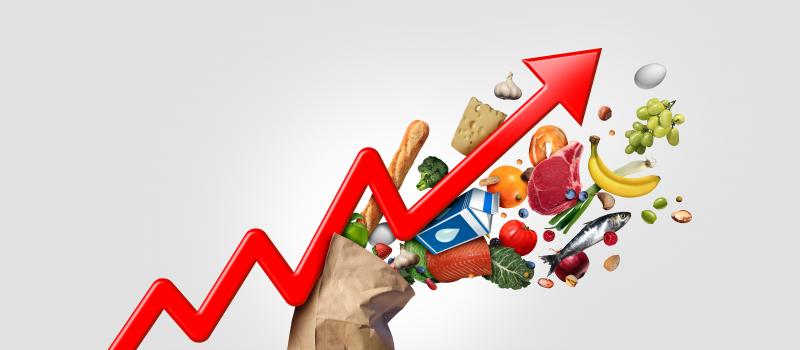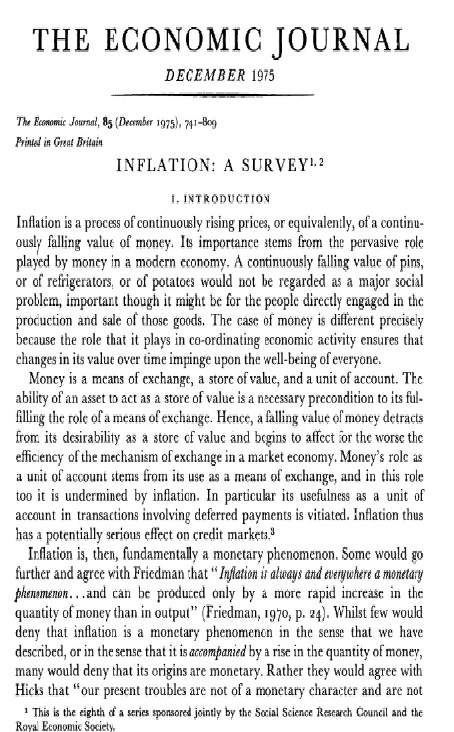Emergence, Weak & Strong: July Spotlight 2022
posted by Lyric Hughes Hale on July 25, 2022 - 1:38pm

Almost exactly fifty years ago, Nobel Prize-winning physicist Philip W Anderson wrote an article in Science entitled More is Different. Just three and a half pages, the article explored a new concept called emergence. The opposite of reductionism, the idea that all phenomena can be explained based upon known rules, emergence theory posits that interactions occur as expected only until a new level of complexity is attained. The symmetry is broken and the hierarchy that once existed is transformed. Suddenly, the result becomes more than the sum of its parts.
Applied to economics, emergence theory might explain why the world is experiencing volatility and unforeseen consequences such as our (mostly) unexpected bout of inflation. If we could accurately account for all interactions in the global economy, would they be reducible to our current situation, or is there a new playbook? In that case, history might no longer be a reliable guide.
Economists have attempted to repurpose scientific theories before; there is even a heterodox branch of economics called econophysics. For a full discussion and a very funny send-up, see Few Things Are as Dangerous as Economists with Physics Envy by John Rapley, a Cambridge political economist.
However, it is possible that this time really is different, and theoretical science can illuminate our changing economic conditions. The incredible level and number of interactions caused by Covid, the war in Ukraine, geopolitical instability, global trade, demographics,and technological change have taken us one level up in complexity, challenging some assumptions of classical economics. The world Keynes inhabited no longer exists.
I was delighted to read Niall Ferguson’s Bloomberg piece, Nobody Knows How Long Inflation Will Last. Humility is not only refreshing, it allows us to work out what is really happening more clearly so that we can know more about the future. The scientific method means that events should be replicable and are therefore predictable. If under new conditions entirely new properties appear, forecasting becomes impossible until we understand the new rules. Do strong employment numbers mean we cannot have a recession for example, or is something new happening?
Emergence theory includes a period of transition before dramatic changes occur. Intuitively, I believe that is where we are sitting now; we are only glimpsing what will later seem obvious. It is a useful way to look at today’s turmoil. However, as philosopher David Chalmers explains in the video below, a serious discussion of emergence necessitates a differentiation between weak and strong emergence. If LaPlace’s all-knowing demon can explain an event, and due to our imperfect human knowledge (lack of data) we are simply unable to understand the hidden mechanisms at work—that is weak emergence. However, there are certain things, including human consciousness, that cannot be fully explained by underlying physical processes—that kind of major leap qualifies as strong emergence.
In his Nobel remarks, Philip Anderson spoke about his abiding love of Japanese culture, where collective behavior is understood to be a thing apart from individual desire. Individual nations, especially the US as the world’s largest economy and issuer of the global reserve currency, can no longer fence in its monetary actions domestically, nor predict their outcome internationally. This uncertainty, combined with the extreme interconnectedness of global financial and trading systems, increases the risk of policy mistakes. Look no further than Sri Lanka, the first of many countries to default on their debts in coming months. They played by the old rules, including low interest rates, that are no longer in effect.
We find ourselves at what scientists call a phase transition, as when water becomes steam or ice under different temperature conditions. I think the only real question is if things are going to get hotter, or colder. Perhaps policymakers should pause a bit, before plunging in.
Emergence
August 4, 1972 / Science
More Is Different: Broken symmetry and the nature of the hierarchical structure of science.
P.W. Anderson
July 4, 2022 / Nature Reviews: Physics ($)
Fifty years of ‘More is different’
Strogatz, S., Walker, S., Yeomans, J.M. et al.
August 1972 saw the publication of Philip Anderson’s essay ‘More is different’. In it, he crystallized the idea of emergence, arguing that “at each level of complexity entirely new properties appear” — that is, although, for example, chemistry is subject to the laws of physics, we cannot infer the field of chemistry from our knowledge of physics. Fifty years on from this landmark publication, eight scientists describe the most interesting phenomena that emerge in their fields.
What is Emergence? (Youtube)
David Chalmers - Why is Emergence Significant? (Youtube)
Inflation
July 17, 2022 / Bloomberg
Nobody Knows How Long Inflation Will Last. That’s Life.
Niall Ferguson
Have we just passed peak inflation? That was the question economists were debating last week, when the US Labor Department published the latest consumer price inflation rate. The index in June was 9.1% above the level a year before — the highest figure since December 1981.
June 2022 / NBER
Comparing Past and Present Inflation
Marijn A. Bolhuis, Judd N. L. Cramer & Lawrence H. Summers
To better contextualize the current run-up in inflation, this paper constructs new historical series for CPI headline and core inflation that are more consistent with current practices and expenditure shares for the post-war period.
May 11, 2022 / Sonecon
The Truth About Today’s Inflation
Robert Shapiro
July 18, 2022 / Mercatus Policy Digest
Randal Quarles on Inflation, Balance Sheet Reduction, Financial Stability, and the Future of the Fed
David Beckworth
The former Fed Vice Chair for Supervision reflects on key issues facing the Fed.
March 11, 2022 / Wall Street Journal
Where $5 Trillion in Pandemic Stimulus Money Went
Alicia Parlapiano, Deborah B. Solomon, Madeleine Ngo and Stacy Cowley
$1.8T to individuals, $1.7T to businesses, $745B in local and state aid, $482B for healthcare.
July 17, 2022 / BIS
Inflation and the path to a soft landing
Hyun Song Shin
The conventional wisdom about inflation needs a course correction.
May 31, 2022 / MarketPlace
Consumers are spending on services again as the pandemic shopping spree for goods cools
Sabri Ben-Achour
Remember how during the worst of the pandemic, when we couldn’t go out, we bought a lot of stuff instead? That stressed supply chains and helped drive inflation. Over the past couple of weeks, there have been signs that the pandemic shopping spree may be cooling down.
May 3, 2020 / Mishtalk
Historical Perspective on CPI Deflations: How Damaging are They?
Mike Shedlock

March 2015 / BIS
The costs of deflations: a historical perspective
Claudio Borio, Magdalena Erdem, Andrew Filardo and Boris Hofmann
Concerns about deflation – falling prices of goods and services – are rooted in the view that it is very costly. We test the historical link between output growth and deflation in a sample covering 140 years for up to 38 economies. The evidence suggests that this link is weak and derives largely from the Great Depression
6/2020 / EconPapers
How does Monetary Policy affect welfare?
Lina El-Jahel, Robert MacCulloch and Hamed Shafiee
Models on the optimal design of monetary policy typically rely on a social welfare loss function defined over inflation and unemployment. Our estimates of such a function use measures of two different dimensions of well-being that have been distinguished by recent research.

